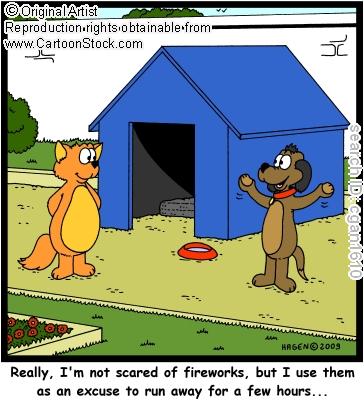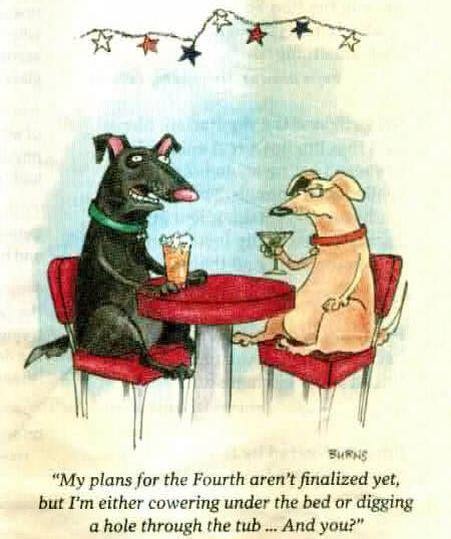Every year many dogs in the NT become terrified, destroy furniture in a blind panic or go missing on and around fireworks night. Most return or are found unharmed, but sadly each year some are never found.
Fortunately with a little bit of planning this is entirely preventable. If your dog is fearful, it is important to understand what you should do in the lead up to Territory Day so as to make sure your little furry friend can cope with the loud night.
Fortunately with a little bit of planning this is entirely preventable. If your dog is fearful, it is important to understand what you should do in the lead up to Territory Day so as to make sure your little furry friend can cope with the loud night.
| Why are some dogs afraid and some are not? Many dogs are terrified of loud noises such as thunder, or gunshots, some more than others. It is entirely natural to be a little fearful of loud noises as they often accompany danger (such as the roar of a lion). But if the reaction is excessive and there is no actual danger, then your dog can come into trouble. To some extent excessive fear is genetic, but it can also be learned if the fear-inducing noise originally accompanied a scary event. And let’s face it, to many animals and even to us, fireworks are excessively loud, and scary. Not only that, they have strong smells and can even start fires which can accentuate these scary scenarios. |
How do I know if my dog is fearful?
Most people will know if their dog is likely to be fearful at fireworks night and to what degree. If your dog is afraid of thunder or gunshots, or has been afraid of fireworks before, it will most likely be afraid of fireworks this time too. Often this fear is greater as generally fireworks are repetitive, close by, loud and inescapable.
Most people will know if their dog is likely to be fearful at fireworks night and to what degree. If your dog is afraid of thunder or gunshots, or has been afraid of fireworks before, it will most likely be afraid of fireworks this time too. Often this fear is greater as generally fireworks are repetitive, close by, loud and inescapable.
| What are the signs of fear / phobia of fireworks? The signs of any loud noise phobia can vary. Sometimes they are mild. Sometimes the symptoms can be severe Different symptoms can include one or more of the following: - Seeking attention - Wanting to hide - Shaking - Freezing - Some dogs will pace or run around - Barking - Urination - Defaecation - Self-trauma - Destroying furniture or other household items - Attempts to escape |
We’ve even come across dogs that have thrown themselves through glass windows, dogs that have tried to dig through concrete floors. It can be quite distressing for many animals as well as the owners to witness their dog’s fears.
What should I do to help my dog?
Remember that although fireworks can only legally be set off on one night, they are often set off illegally on nights before and after so you need to plan ahead.
1. Provide a safe place: Make sure your dog has a safe and secure area to shelter in well ahead of time. Somewhere comfortable, with possibly a blanket to hide under. Often you may know your dog’s safe place.
Remember that a yard or area of a house that normally provides a secure area can be broken out of in a blind panic during fireworks. Dogs have been known to scale high fences and dive through glass windows when panicked. So careful planning is essential
2. Play familiar noises and block out vision of the fireworks: It can be helpful to drown out the loud noises by having the TV on or leaving a radio on. This may help relieve the incessant noises from outside. Also blocking the vision of fireworks may reduce the anticipation and association with these noises.
3. Keep an eye on your dog: It is preferable to have someone home with the dog to supervise and support them if at all possible. Comfort your dog if they require support. Otherwise, act happy and confident, and reward your dog for confident behaviour.
4. Most importantly, speak to your vet: If you know or suspect your dog will become afraid during this period, it is essential to have a talk to your vet. They may advise pheromone therapy or prescribing some sedatives or anti-anxiety medication for your dog. These are often essential for some animals and offer the safest, most effective way to get your dog through this period with as little stress and hassle as possible.
Remember that although fireworks can only legally be set off on one night, they are often set off illegally on nights before and after so you need to plan ahead.
1. Provide a safe place: Make sure your dog has a safe and secure area to shelter in well ahead of time. Somewhere comfortable, with possibly a blanket to hide under. Often you may know your dog’s safe place.
Remember that a yard or area of a house that normally provides a secure area can be broken out of in a blind panic during fireworks. Dogs have been known to scale high fences and dive through glass windows when panicked. So careful planning is essential
2. Play familiar noises and block out vision of the fireworks: It can be helpful to drown out the loud noises by having the TV on or leaving a radio on. This may help relieve the incessant noises from outside. Also blocking the vision of fireworks may reduce the anticipation and association with these noises.
3. Keep an eye on your dog: It is preferable to have someone home with the dog to supervise and support them if at all possible. Comfort your dog if they require support. Otherwise, act happy and confident, and reward your dog for confident behaviour.
4. Most importantly, speak to your vet: If you know or suspect your dog will become afraid during this period, it is essential to have a talk to your vet. They may advise pheromone therapy or prescribing some sedatives or anti-anxiety medication for your dog. These are often essential for some animals and offer the safest, most effective way to get your dog through this period with as little stress and hassle as possible.
Dr Alex Burleigh is based in Katherine, NT at Katherine Veterinary Clinic, part of Northern Territory Veterinary Services. He is a part owner and one of the senior veterinarians at both Katherine Veterinary Clinic and Alice Veterinary Centre. Dr Alex Burleigh is a published author with works appearing in veterinary texts, scientific journals and online websites. He consults regularly at both practices.




 RSS Feed
RSS Feed